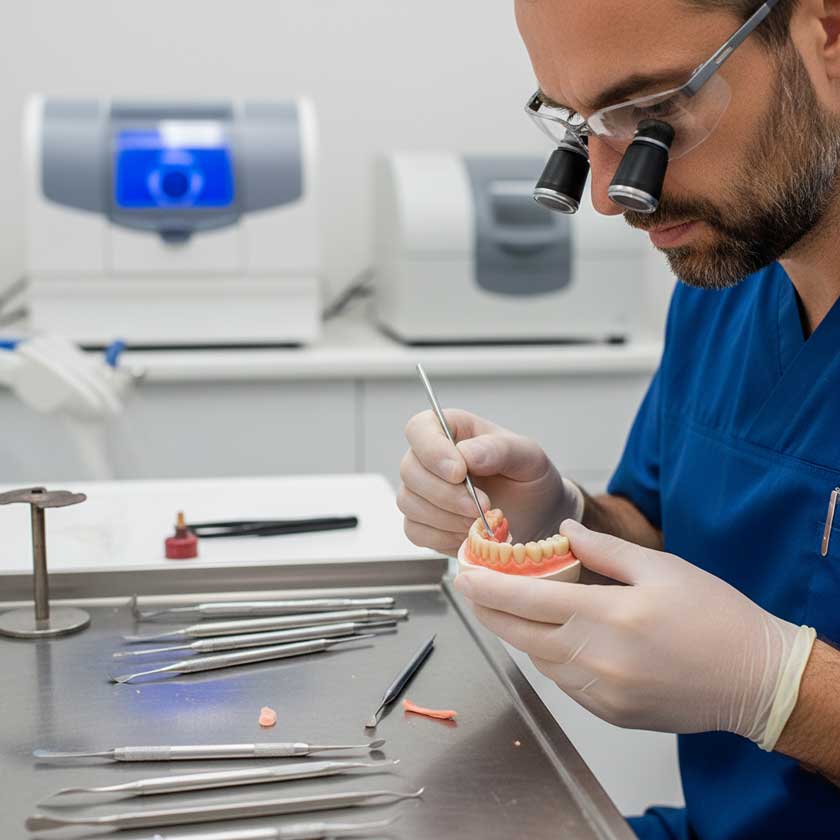Are your dentures causing you problems? Understanding the five signs that indicate a need for denture replacement or repair is important. It can help you avoid further discomfort and maintain good oral health. This article will guide you through these key indicators, reassuring you that professional help is available when you need it.
Key Takeaways:
- If you're having trouble chewing or eating, it's time to check your dentures for misalignment.
- Persistent mouth irritation or discomfort, like soreness or redness, indicates that your dentures might need adjusting or replacing.
- Visible damage or wear, such as cracks or chips, means you should seek professional repair to avoid further oral health issues.
1- Difficulty chewing or eating.
Imagine the comfort of biting into a crisp apple without your denture moving excessively. This is how it should be. Properly fitting dentures should allow for comfortable and effective eating by spreading the pressure evenly. If you find it difficult to chew or eat, this could be a clear indication that your dentures require adjustment.
Consider the discomfort of biting into a crisp apple only to experience your denture moving excessively. Not only does this make it hard to eat, but it can also result in additional issues with your dentures, such as cracks or breaks. Regular maintenance is essential to maintain their proper fit and functionality, ensuring hassle-free chewing.
It's worth noting that advances in denture technology, such as implant-supported dentures, can significantly improve chewing ability and overall comfort. These modern solutions offer more excellent stability and a more natural feel than traditional dentures.
When dentures don't align properly, they can impair how you speak. If slurring or mispronouncing words becomes an issue, it might be time for a denture check-up on your prosthesis's alignment, which is crucial in comfort during wear and smooth communication capabilities!
Eating shouldn't be tedious or painful, so if you feel uneasy while munching away, reach out immediately! Consulting with highly skilled care providers will enable prompt adjustments tailored specifically to enhance the fitting quality and operational efficiency—designed so patients like yourself can relish every bite without concern soon enough!

2- Mouth irritation and discomfort.
Continual discomfort and irritation in the mouth can indicate an issue with your dentures. Improperly fitted dentures may cause friction against the gums, leading to pain, soreness, or gum sores. Should you notice such symptoms, including redness and sore spots on your gums, it is advisable to seek advice from a dental professional.
A frequent complication associated with poorly fitting dentures is denture stomatitis, an inflammation in the mouth caused by an overgrowth of candida fungus. This condition affects around 70% of individuals who wear full dentures and manifests as swelling, irritation, and noticeable reddening beneath the upper set of false teeth.
It's important to understand that denture-related discomfort isn't something you should endure. Modern dentistry offers solutions like soft liners or implant-supported dentures that significantly reduce irritation and provide a more comfortable experience.
Poor-fitting artificial teeth can also lead to other infections, like cheilitis or stomatitis, which lead to severe oral discomfort and could escalate if left untreated. To fend off these potential issues related to wearing prosthetic teeth (dentures), it's essential for wearers to consistently attend dental check-ups and adhere strictly to proper care routines for their artificial apparatuses, which are critical steps toward maintaining overall oral hygiene.
3- Loose or falling-out dentures.
If your dentures slip or come out, you need them adjusted urgently. When properly fitted, dentures should remain secure without causing discomfort to the gums. Continuous repositioning of your denture or concerns about its stability indicates that you should seek a dentist's assessment.
Loose-fitting dentures amidst missing teeth often exacerbate the difficulty of chewing and speaking clearly. Problems with enunciation or slurred speech can be humiliating and exasperating, potentially affecting self-assurance during social interactions. Thus, prompt resolution is necessary.
While loose dentures are typical, it's crucial to recognize that dentists or denturists can adjust or relines to improve the fit. Dental implants can sometimes anchor dentures, providing unparalleled stability and comfort.
At times, multiple adjustments may still fail to ensure a suitable fit for your dental prosthetic. Should issues persist with your current setup, considering alternatives like replacing old dentures with dental implants or opting for partials might offer more reliable and enduring outcomes. Dental implants mainly provide firm support to prevent movement while enhancing comfort.
Avoid letting unsettling developments adversely affect daily life enjoyment. Schedule time with a dentist or denturist to discuss various avenues, such as employing adhesives temporarily. Whether settling on an alteration service, a complete replacement, or pursuing implantation methods for effective tooth restoration and replicating the function of natural teeth, following corrective measures will empower you with restored assurance and practical capability.
4- Visible damage or wear.
If you discern significant damage or deterioration on your dentures, such as a cracked or chipped base, it's an unmistakable signal that they require either repair or replacement. These defects can lead to uneven surfaces, which may irritate the soft tissues of your mouth and cause substantial pain while potentially compromising the bone structure beneath it.
Imagine passing your tongue over a jagged edge or fracture in your denture. This is not only distressing but could precipitate more severe dental health issues if neglected. Compromised dentures might result in conditions like TMJ disorder—which affects the joints and muscles of the jaw—along with headaches, chewing difficulties, and overall discomfort.
It's worth noting that advances in materials science have led to the development of more durable denture materials. High-impact acrylics and flexible nylon materials can offer greater resistance to damage and wear, potentially extending the lifespan of your dentures.
To prevent these complications from arising, it's crucial to address any discrepancies regarding your teeth replacements swiftly. Given their average lifespan of 5-10 years under normal use conditions, some wear on dentures should be anticipated. Nevertheless, by closely observing for changes in condition—and seeking prompt, professional aid when necessary—you can ensure early intervention for repairs, thus extending usability while preserving oral wellbeing.
Being familiar with five key warning signs indicating possible harm to one's artificial teeth apparatuses is essential. If detected, consulting with a dentist becomes imperative. Assessing the degree of sustained injury will enable recommendations regarding whether mending substitutes merit deliberation.
The top five indicators hinting at potential impairment within prosthetic setups consist of:
- Visibility fractures
- Presence portions missing due breaks chips
- Detectability loosened elements, particularly those involved in grip bite
- Broken down core structures holding parts together securely
- Lastly, there is a loss of natural color tone finish
5- Stains and discoloration.
Stains and discoloration on your dentures can detract from your bright smile and shake your self-confidence. Dentures are prone to yellowing or browning over time, especially when exposed to chromogenic substances like coffee, tea, red wine, and various berries. Not maintaining proper cleanliness of the denture can lead to unsightly stains due to plaque and tartar accumulation.
Smoking or chewing tobacco contributes significantly to trapping stains and expediting the discoloration process. With age, dentures tend naturally toward increased porosity, which leaves them even more vulnerable to staining.
While staining is a common issue, modern denture materials are often more resistant to discoloration. Additionally, professional cleaning services can often restore the original color of your dentures, potentially avoiding the need for replacement.
Replacing heavily stained dentures is a viable solution for reviving that vibrant smile while bolstering self-assurance. Adhering strictly to routine cleaning practices can significantly contribute to keeping dental prosthetics looking as good as new. Avoidance of drinks with heavy pigmentation will help.
This causes, but if significant staining has occurred, professional cleaning services may be sought after, along with contemplating replacement of said devices. Should such measures be necessary for regaining optimal aesthetic results regarding their appearance, thus aiding in restoring functionality, especially related to the efficient ability required during food mastication (chewing)?

Importance of regular dental check-ups.
Regular dental check-ups are essential for maintaining the comfort and health of your dentures and mouth. By having a dental professional evaluate your dentures every two to four years, you can determine whether adjustments or replacements are necessary. These checks help catch issues early on, ensuring your denture remains appropriately fitted.
Proper care for your dentures, along with consistent visits to the dentist, helps prevent infections that may stem from ill-fitting or damaged pieces. Dentists offer crucial insights into keeping oral hygiene and dentures in top condition, thus helping fend off irritation, potential infections, and general discomfort associated with improper fitting.
Understanding that dental check-ups aren't just about maintaining dentures is crucial. They also provide an opportunity for your dentist to screen for oral cancer, assess your overall oral health, and discuss potential alternatives to traditional dentures that might better suit your changing needs.
By scheduling regular appointments with a dental professional, you will secure the following:
- Ongoing comfort and functionality of wearing your dentures
- The ability to confidently share a beautiful smile
- Sustained superior oral health well into the future
Summary
It is essential to acknowledge the indications that your dentures require servicing or substitution for the preservation of oral health and general wellness. If you encounter trouble while chewing, feel irritation in your mouth, notice that your dentures are not fitting snugly, or observe apparent damage or discolorations on them, these signs signal the need to consult a dentist.
Keeping alert and committing to routine dental appointments will help keep your dentures in optimal shape. This commitment ensures that you retain a smile imbued with confidence and comfort and that it is fully functional when it comes to chewing.
While dentures have been a reliable solution for many years, staying informed about the latest advancements in dental prosthetics is essential. From implant-supported dentures to 3D-printed solutions, dentistry continues to evolve, offering more comfortable, durable, and natural-looking options for those with missing teeth.








